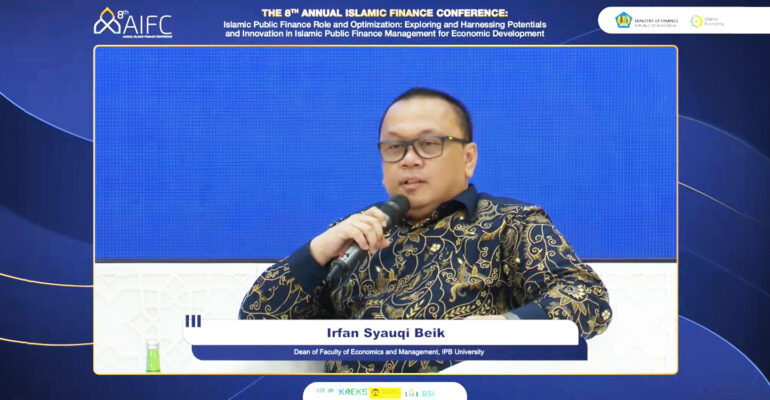IPB University Sharia Economics Expert Highlights Integration of Maqashid Sharia in Fiscal Policy

IPB University’s Sharia Economics expert, Dr Irfan Syauqi Beik, emphasized the importance of integrating the framework of maqashid sharia into fiscal policy and public finance management. He made this point during a panel discussion on the second day of the 8th Annual Islamic Finance Conference (AIFC) organized by the Ministry of Finance of Indonesia, held at the Ministry of Finance Building in Jakarta (4/10).
Maqashid sharia refers to the objectives of sharia, which encompass the protection of five fundamental aspects of human life: religion, life, intellect, lineage, and wealth.
Dr Irfan explained that in designing Islamic fiscal policies, the fundamental principles of Islamic law (qawaid fiqhiyah) must be fully understood. “Islamic public finance must be based on maslahat, meaning sustainable benefits for society, while avoiding mafsadah (greater harm),” he said.
The Dean of the Faculty of Economics and Management (FEM) at IPB University stressed that maintaining fiscal stability and avoiding mafsadah is more important than achieving short-term gains.
Additionally, Dr Irfan underscored the crucial role of the state in Islamic fiscal policy. He stated that the state must perform protective and economic stabilization functions, and manage taxes and debt in accordance with sharia principles.
“Although controversial, taxation in the context of Islam is not forbidden as long as it is used for the public good and justified by sharia law,” he explained.
Furthermore, Dr Irfan outlined several fundamental principles in the management of taxes and debt within the framework of Islamic fiscal policy. According to him, taxes should be levied on halal assets and benefit the public, with fair rates.
Meanwhile, government debt should only be incurred in emergency situations, such as financing wars or other urgent needs, and must consider the country’s capacity to repay the debt.
Dr Irfan also highlighted the importance of zakat and waqf as key instruments in Islamic public finance. “Zakat, as a social obligation, and waqf, as a source of long-term funding, should be more integrated into fiscal policy to support inclusive economic development,” he added.
He cited examples of successful zakat systems in countries such as Malaysia and Singapore, which could serve as models for other Muslim countries.
Dr Irfan proposed that Indonesia could more deeply integrate zakat and waqf into its fiscal system, as has been done in Aceh. “Aceh has demonstrated how zakat and waqf can become sources of regional revenue, which can be directly distributed within the same fiscal year,” he remarked.
Dr Irfan hopes that Indonesia will strengthen its fiscal policy framework based on maqashid sharia and leverage the potential of the halal and digital economy to accelerate sustainable and inclusive economic growth.
He also praised the initiatives of Bank Indonesia and the Central Bureau of Statistics (BPS) in promoting the concept of Islamic GDP, or Gross Domestic Product based on Islamic principles, as an effort to measure economic welfare within the framework of sharia. (MW/Rz) (IAAS/RUM)



